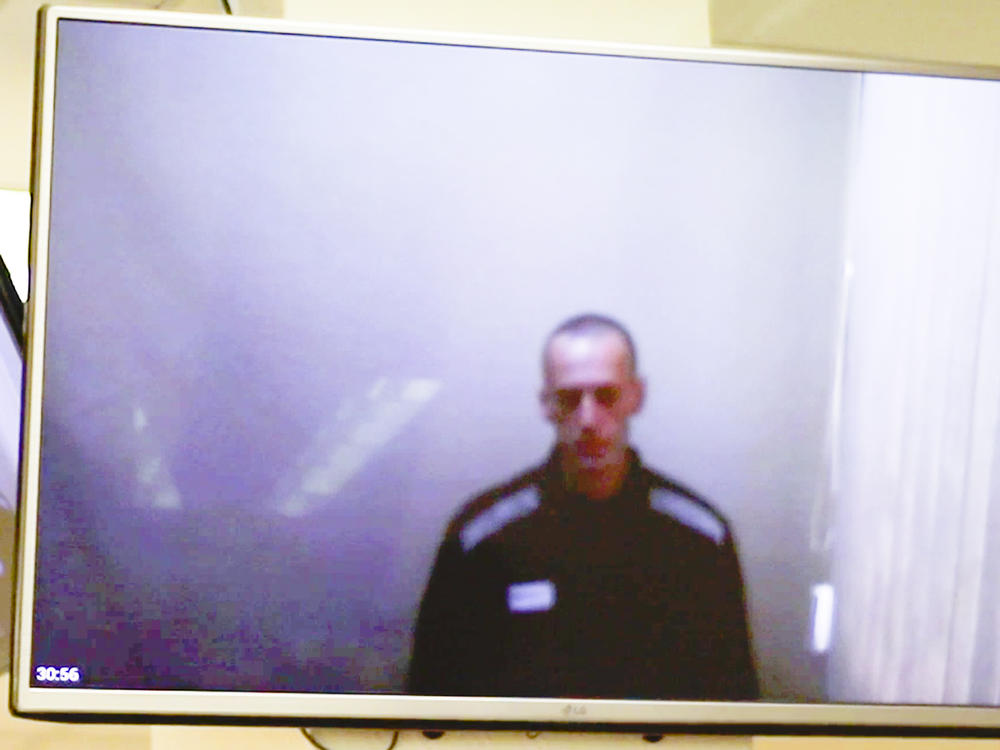Section Branding
Header Content
In Court Hearing, Navalny Calls Putin A 'Naked, Thieving King'
Primary Content
Looking gaunt after a weeks-long prison hunger strike, a defiant Alexei Navalny appeared by video link in court on Thursday, where he denounced Russian President Vladimir Putin as a "naked, thieving king."
The hearing comes as Navalny's anticorruption network – the backbone of his political organization – said it would shut down because it could no longer operate amid Kremlin efforts to have it declared an "extremist" organization. Earlier this week, the Babushkinsky District Court in Moscow ordered the network's activities suspended in an apparent prelude to it being permanently shuttered.
Navalny's remarks on Thursday before the court in Moscow were seen on a blurry video connection from the prison where the opposition figure has been held since he was sentenced in February.
It was the first court appearance for the 44-year-old activist since he embarked on a March hunger strike that lasted 24 days to protest a lack of medical attention for pain in his leg and back. Last week, Navalny announced that on the advice of doctors he would discontinue the protest.
Even so, tens of thousands of people demonstrated nationwide last week as a show of solidarity with Navalny. Hundreds were detained by police.
The Thursday hearing was aimed at appealing a guilty verdict on a charge that Navalny defamed a World War II veteran, a charge widely seen as politically motivated. Among other things, the court rejected an appeal to void an 850,000 ruble ($11,500) fine in connection with the conviction.
Sporting a newly shaved head, Navalny told the court that he had tried to tidy himself to look "decent" for the hearing. He undid his prison uniform to reveal a T-shirt covering his thin torso.
"I looked in the mirror," he said according to Reuters. "Of course, I'm just a dreadful skeleton," the reportedly 189 cm (6' 2") tall opposition leader said, adding that he now weighs just 72 kg (159 pounds) — the same weight as when he was a teenager.
At one point in the proceedings, Navalny interrupted the judge before being rebuked. "I want to tell the dear court that your king is naked," he said of Putin. "His crown is hanging and slipping."
He reiterated allegations of corruption that the Kremlin has denied: "Your naked, thieving king wants to continue to rule until the end. ... Another 10 years will come, a stolen decade will come," he said.
Meanwhile, Leonid Volkov, who runs Navalny's regional political offices, said Thursday that it had become "impossible" for them to continue operating after the government suspended their operation.
"We're officially dismantling the network of Navalny's headquarters," Volkov said on the messaging app Telegram, according to Reuters.
On YouTube, Volkov said that continuing "would immediately ... lead to criminal sentences for those who work in the headquarters, who collaborate with them and for those who help them."
In August, Navalny suddenly fell critically ill on a commercial flight in Russia. After treatment in a Russian hospital he was medevaced to Germany, where doctors determined that he had been poisoned by Novichok, a Soviet-era military grade nerve agent that had reportedly been used by Russian intelligence in a previous assassination attempt on a former Russian spy in the U.K. Navalny has blamed Putin for ordering his death, an allegation that the Kremlin denies.
Navalny's allies said Thursday that as they studied the case files against Navalny's political organization, they discovered that he, Volkov and Ivan Zhdanov, the head of Navalny's Anti-Corruption Foundation, or FBK, are facing previously unknown criminal charges, according to The Moscow Times.
The three stand accused of creating an organization "infringing upon the liberties and rights of individuals," an offense punishable by up to four years in jail, the newspaper said.
Copyright 2021 NPR. To see more, visit https://www.npr.org.

